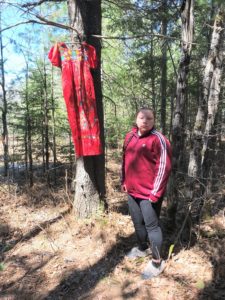12-year-old Anishinaabe youth delivers powerful message on MMIWG

By Andrea Smith
GARDEN RIVER FIRST NATION—A powerful voice emanates from only a 12-year-old girl’s body, in a YouTube video posted online. Her chosen topic: the Missing and Murdered Indigenous Women and Girls of Canada.
Nevaeh Pine, from Garden River First Nation, is strong in her stance, as she asks, “If I went missing, would you look for me?” while standing in the woods next to a red dress.
She put the dress up on the tree to symbolize the REDress project—an art installation representing the same issue which travelled nationally.
Nevaeh’s question is the first line to the speech she originally wrote for a class public speaking assignment, she said.
In the online video, she continues to say, “Would you see my face all over the news? Would you care? Would you demand to know, what happened to that girl?
These women are someone’s mother, someone’s daughter… These women are someone.”
Pine wrote the speech this past school year, knowing it would be difficult, but wanting to raise awareness around it anyway. The issue is one close to her heart—not because she has lost someone to it, but because she herself is afraid of becoming an MMIWG. Her speech is both a cry for help, and a call to action, she said.
“Many of these women were completing their education. Women like Loretta Saunders, a woman who was completing her honor’s thesis on this very subject, when she herself went missing,” says Nevaeh in her video. She then talks about Maisy Odjick and Shannon Alexander who were only teenagers at the time they went missing, as well as Tina Fontaine, another teenager, whose case laid the groundwork for the National Inquiry into MMIWG to take place.
“Tina Fontaine was 15-years-old. Her body was pulled from the Red River in Winnipeg, where many other women were found. It was Tina Fontaine’s case that made an impact…” Nevaeh pounds her fist into her other hand at this point, staring straight into the camera, as though making eye contact with viewers everywhere.
Nevaeh’s mother, Natalie, says every time her ordinarily soft-spoken daughter begins this speech—and she has shared it in her school, as a guest speaker in other schools, as well as in a provincial public speaking competition by now—something in her changes. And even other people who know Nevaeh are surprised at how bold she suddenly seems, said Natalie.
“She finished second for her oral on the Jingle Dress,” said Natalie, referring to a public speaking competition at the provincial level which Nevaeh participated in two school years ago.
“As we were leaving, she was her happy self, and she said, ‘That’s okay, mom. Next year I’m going to do the Missing and Murdered Indigenous Women.’ I thought, ‘Okay. That’s a big subject for a little girl.’ And she did it… She did everything,” Natalie said.
According to Natalie, her and Nevaeh spent a few months researching the topic intensively before Nevaeh was able to choose the right words for the message she wanted to share. Together they watched documentaries like No More Stolen Sisters, and scoured the internet for more information.
Natalie said that while it was hard sometimes, to watch her daughter taking in so much grief, she knew she was doing something she felt was important. There were a lot of tears from them both, added Natalie, but they also used the time to talk about safety for Nevaeh.
When asked about what that process was like for her, Nevaeh said it was “sad.”
“Sad… Very sad. I was angry that it was happening, and it just made me upset,” she said.
Taking her speech to the broader community, outside of just her school, was another challenge. Natalie said as a mother she was fearful for what people might say after hearing the speech. But to both of their surprise, and delight, the feedback has always been good. Some people are even moved to tears, including both Indigenous and non-Indigenous audience members, said Natalie.
“I remember once, this little old man came up, with his little hat on, and he just patted her on the back… And he said, ‘Wow. Thank you for your speech’,” said Natalie.
This particular man was non-Indigenous, she added.
“I think that’s why it’s making such an impact…. People see her standing there and they say, ‘Wow, that’s a little girl. And that could happen to her. Or anybody,” said Natalie.
With the National Inquiry now having called the issue “Genocide,” Nevaeh and her mother feel even more justified in Nevaeh’s work. Natalie has explained to her daughter what Genocide means, and now that Nevaeh knows, she is happy the whole country is recognizing the issue in this way, she said.
Yet she still hopes for better.
“I’m very happy they admitted it was genocide. But I’m also very upset about that they were trying to eliminate that stuff,” said Nevaeh, referring to the people who are arguing genocide isn’t the right word. “Now that they’ve admitted it and stuff, I just hope that they try harder, and work more on the subject, and just like make a bigger change.”
To see Nevaeh’s speech on YouTube go to: https://www.youtube.com/watch?v=qffVAhRiFBk


